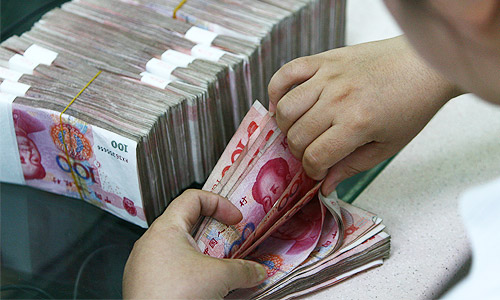|
 |
|
NEW RECORDS: The yuan rose to new heights against the U.S. dollar in September (LU QIJIAN) |
The central parity rate of the yuan, the Chinese currency, rose 115 basis points, or 0.17 percent, on September 29, to a new record high at 6.6936 per U.S. dollar, according to the data released by the China Foreign Exchange Trading System. It beat the previous record of 6.6997 on September 21.
The yuan has rallied against the U.S. dollar and seen increased volatility in the trading days since China's central bank, the People's Bank of China, decided to push the reform of the yuan exchange rate regime forward and increase the currency's flexibility on June 19 this year.
Based on the central parity on September 29, the Chinese currency has strengthened against the U.S. dollar by 1.96 percent from the rate of 6.8275 per U.S. dollar on June 18, the day before the central bank's pledge to increase the yuan's flexibility.
China began to reform the exchange rate regime for its currency in July 2005, and moved into a managed floating exchange rate regime based on market supply and demand with reference to a basket of currencies.
By the end of 2008, the yuan had appreciated 20.7 percent against the U.S. dollar.
Rising pressure
The yuan's appreciation has accelerated since September, which is believed to be in response to U.S. pressure in recent weeks.
"It's groundless for the United States to criticize China's exchange rate policy simply according to the trade surplus," said Yao Jian, spokesman with the Ministry of Commerce.
China doesn't want "a few politicians" to attract votes by accusing China's trade policies, especially the currency policy, Yao added.
The yuan exchange rate is one of the tools for China to pursue economic restructuring and China is making efforts to cut its reliance on external demands and focus on domestic demand, said Li Daokui, member of the Monetary Policy Committee of the People's Bank of China and a professor at the School of Economics and Management of Tsinghua University, at the 2010 China CEO Forum on September 17.
But China's situation is different from that of Japan in 1985, and the yuan will not simply appreciate because of external pressure, Li added.
The recent appreciations of the yuan can also be linked to the depreciating trend of the U.S. dollar, said Tan Yalin, Director of the China Foreign Currency and Investment Research Institute.
August statistics on China's macro-economy boosted investors' confidence in the global economic recovery, and the yuan attracted larger inflows of investment capital, diverting investors' interest from the U.S. dollar, Tan said.
| 